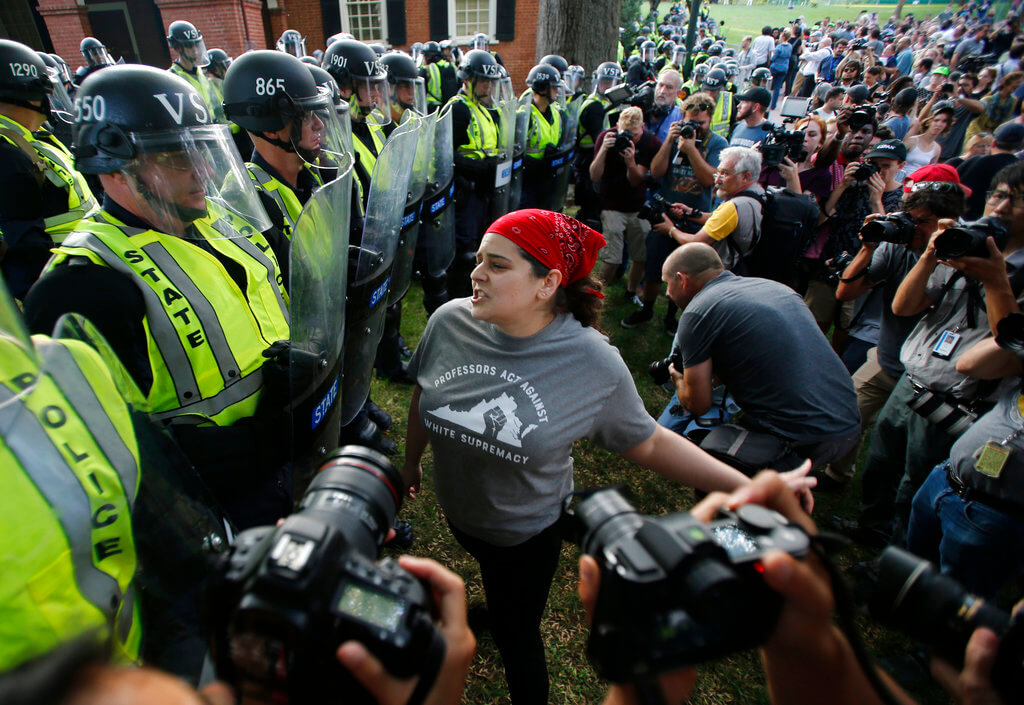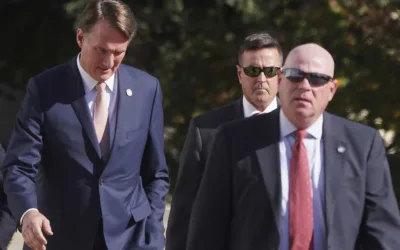
A protester confronts riot gear-clad police on the campus of the University of Virginia during a rally to mark the anniversary of the Unite the Right rally in Charlottesville, Va., Saturday, Aug. 11, 2018. (AP Photo/Steve Helber)
In 2017, Charlottesville became the focal point of white supremacy in America when it was the unwilling host of the Unite the Right Rally. During the two-day riot, a counter protester was killed, and the fallout led Charlottesville’s police chief to retire after considerable criticism of his department’s handling of the rally. The city council vowed to improve the police force, so they decided to create a Civilian Review Board.
But two years later, that board hasn’t officially met yet. (As Dogwood was reporting this story, they scheduled their first meeting for June 29.) And Police Chief RaShall Brackney, who took over the department after the previous chief retired in December of 2017, doesn’t have a lot of faith in it.
“I don’t know if the foundations were properly put in place or if there was a consideration of the type of input that might need to be to set up to have a really robust and, really, a legitimate CRB,” she said in an NPR interview.
Brackney’s concerns and the boards’ inactivity illustrates how hard it can be to enact policing reforms, even in a city as motivated as Charlottesville was after the 2017 riots.
Activists have long called for police reform, but the murder of George Floyd in Minneapolis raised tensions to a fever pitch throughout the United States and in Charlottesville. After weeks of demonstrations, local officials have been left to discuss what their cities might look like if they pull some funding from police departments.
Charlottesville City Councilmember Lloyd Snook explained that city officials have been working for years to create more accountability for the police, but efforts like the Civilian Police Review Board haven’t gotten very far. He said once the board was initially created, the city council didn’t give its members much guidance about the scope of their power and how they should structure their recommendations.
“They said this was a way of getting community engagement and all that but community engagement without any sort of guidance becomes a real problem,” he said. “And so what we wound up with was people deciding they wanted to try to push the envelope on what is permissible under Virginia law. They wanted to give the Civilian Review Board power over police discipline for example.”
Snook explained that Virginia law is clear about police discipline. Dogwood reached out to former members of the Civilian Police Review Board but received no response.
“The answer is no, they can’t do that,” he said.
Since the police killing of George Floyd, the phrase “defund the police” has become a rallying cry. But it doesn’t mean completely dissolving police departments. Instead, it means reducing the budget of a local police department and directing those funds to other social programs like education, housing and health care. Often a city’s police department budget eats up a large portion of the overall budget.
In Charlottesville, for instance, the police department used 41% of the city’s budget in 2019 for all public safety functions and cost a total of $16.8 million, according to city documents. The combination of public safety and justice for the city came to a total of $41.1 million.
Pulling funding from the police department would allow cities to provide other services to its residents. Activists argue that money from police departments could go towards creating mental healthcare infrastructure, additional programs for students and support unarmed first responders for situations that don’t require force.
“There is no good reason why the police should have more money than our educators,” Althea Laughon-Worrell told NBC29 during a march in Charlottesville on June 13. Laughon-Worrell helped to organize one of the many demonstrations in Charlottesville in the last few weeks. She called for defunding the police and directing the money to other programs in the city.
Local officials in Charlottesville are giving the idea some careful consideration. Snook said that he expects the council to discuss programs that could help the police department without completely abolishing it.
“When I discuss what defunding the police looks like I’m going to accept for a moment the interpretation that it really means reduce the size of the police force, not eliminate everybody with an arrest power,” Snook said in an interview with Dogwood. “So to me that means, lets figure out if there are some situations that don’t require a police response at all, maybe they require a response from somebody with a mental health background.”
He noted that one successful program he would be willing to discuss and possibly support is called Crisis Assistance Helping Out in the Streets (CAHOOTS). The program, which is based in Eugene, Oregon, provides 24/7 mobile crisis intervention to people in need. Members of the CAHOOTS team are trained to deal with suicide, conflict resolution, housing crises and urgent medical medical needs, among other issues. Each CAHOOTS team has a medic and crisis worker that can be dispatched through the local emergency dispatch center and address help people in crisis situations.
CAHOOTS provides the community an additional service that can help in an emergency situation without involving the police.
“They’re not armed, they’re not in uniform and they’re not threatening,” Snook said. “They’re just trying to see if they can help and in 2017 they were sent 24,000 calls which is 24,000 calls that don’t end up escalating into police confrontations. I’d like to see Charlottesville try to work on a model like that.”
Charlottesville Vice Mayor Sena Magill noted in an interview with Dogwood that there are a lot of ways policing in the city could be reformed. She said that in recent years local police departments have become “de facto mental health liaisons” for the community, old laws have made it easy to lock people up on meaningless charges and officers can’t afford to live in the areas they serve.
“Police are called into so many things that the police should not have anything to do with. They’re called in for social work cases for child custody cases they are often the ones who are first to respond especially if it’s considered an emergency situation and that’s just not their job,” Magill said.
Magill was hesitant to say she supports defunding the local police but, she explained, if Charlottesville were to defund their police department it would need to have a plan in place before any major changes are implemented.
Despite ongoing calls from activist groups to defund the police the idea has been met with some concern from members of the community.
Snook explained that any budgeting decision for the police department would need to take place next year since the city’s 2021 budget is already set.
“We don’t have time to stop and have an extended policy discussion, let’s have discussions on policy in August, September, or October and then the next budget can reflect these new priorities rather than thinking we’re going to jam everything into it now,” Snook said. “That’s a discussion I want to get going and I want to get it going pretty soon.”
UPDATE: Updated to reflect that the PCRB scheduled its first meeting for June 29.

Here’s everything you need to know about this month’s Mercury retrograde
Does everything in your life feel a little more chaotic than usual? Or do you feel like misunderstandings are cropping up more frequently than they...

VIDEO: Check out Dogwood’s new merch line
Big news, Virginia! We've officially launched our Dogwood merch line 🎉 This year, we celebrate 5 years of bringing you Virginia news you can use....

VIDEO: Your support matters!
Your support matters! Donate today. @vadogwoodnews Your support matters! Visit our link in bio to donate today. #virginianews #virginia #community...

Op-Ed: Virginia’s new Democratic majorities pass key bills to improve your lives, but will Youngkin sign them?
The 2024 Virginia General Assembly regular session has wrapped up. It was a peculiar session from the outset, with Democratic majorities in the...

From the state rock to the state flower, here’s how Virginia got its symbols
Have you ever wondered why the Dogwood is the state flower? Or how the cardinal became the state bird? We’re here to answer those questions and more...

VIDEO: Second-gentleman Douglas Emhoff gives speech on reproductive freedom
Second gentleman, Douglas Emhoff touched on reproductive freedom not only being a woman's issue but "an everyone's issue" during the Biden-Harris...





